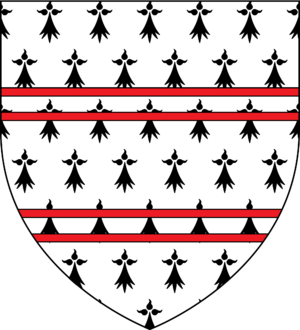Walter de Huntercombe, 1st Baron Huntercombe facts for kids
Quick facts for kids
Walter de Huntercombe
|
|
|---|---|
 |
|
| Born | 1247 |
| Died | 1313 (aged 65–66) |
Walter de Huntercombe (born 1247, died 1313) was an important English knight and leader. He served King Edward I in many battles and was even in charge of Edinburgh Castle for a time. He became the first Baron Huntercombe, which was a special title given by the King.
A Knight's Early Adventures
Around 1283, Walter de Huntercombe joined a military trip to Wales. This was part of King Edward I's plan to take control of Wales. Walter was put in charge of a castle called Castell y Bere. He made sure the castle was well-guarded and even added a new room while he was there.
In 1290, Walter had another important job. He was sent to take control of the Isle of Man for King Edward I. The island had been controlled by the Scots before this. However, a few years later, in 1293, King Edward I told Walter to give the island back to John Balliol, who was the King of Scots and served King Edward.
Serving the King
In 1294, King Edward I called Walter to Portsmouth. This was because the French had taken over an area called Duchy of Gascony. Walter was ready to help the King. For all his hard work and loyalty, King Edward I gave Walter a special reward in 1295. He made Walter a Baron, which meant he became Baron Huntercombe.
Battles in Scotland
Walter de Huntercombe played a big part in the Wars of Scottish Independence. These were long conflicts between England and Scotland.
In 1296, Walter was at the Capture of Berwick, a major battle where England took control of the town of Berwick. He had 20 knights with him. The next year, in 1297, he was also at the Battle of Stirling Bridge, a famous battle where the Scots won. Walter had 32 knights with him there.
In 1298, Walter was given a very important job: he became the Governor of Edinburgh Castle. This meant he was in charge of one of the most important castles in Scotland. He was also made the Sheriff for the areas around Edinburgh, Linlithgow, and Haddington.
In 1301, Walter was one of the important people who signed a letter to Pope Boniface VIII. This letter was from many English barons. Later, in 1307, Walter asked the King to let him off from paying a special tax called "scutage" for the wars in Scotland. He said he had served in both wars, so he shouldn't have to pay. The King agreed!
Walter de Huntercombe passed away in 1313. He did not have any children, so his title of Baron Huntercombe ended with him.
 | William M. Jackson |
 | Juan E. Gilbert |
 | Neil deGrasse Tyson |

